Clifford Simak Doubts His Religion
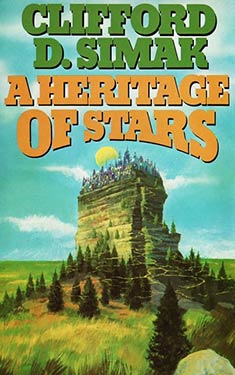 Clifford D. Simak became the third SFWA Grand Master in 1977, but few contemporary SF fans know his work today. A Heritage of Stars is one of his later books, one so obscure that Wikipedia doesn’t even have an entry for this 1977 novel. Simak was born in 1904, and died in 1988, so A Heritage of Stars was written in his mid-seventies, towards the end of his career. I think that’s significant because the book feels like a summation of Simak’s thoughts on science fiction. I know the older I get, the more I want to make sense of a lifetime of reading science fiction.
Clifford D. Simak became the third SFWA Grand Master in 1977, but few contemporary SF fans know his work today. A Heritage of Stars is one of his later books, one so obscure that Wikipedia doesn’t even have an entry for this 1977 novel. Simak was born in 1904, and died in 1988, so A Heritage of Stars was written in his mid-seventies, towards the end of his career. I think that’s significant because the book feels like a summation of Simak’s thoughts on science fiction. I know the older I get, the more I want to make sense of a lifetime of reading science fiction.
We’ve been reading A Heritage of Stars in my book club this month, and the consensus was it’s ho-hum. However, this is my second reading, and the story has improved — significantly. Simak cranked out sixteen novels in the last two decades of his life. Most of them have no entries on Wikipedia. Simak is famous for City (1952) and Way Station (1963), with his first story published in a 1931 issue of Wonder Stories. He wrote science fiction for six decades!
When you consider Simak’s unique perspective, A Heritage of Stars, takes on new meaning. It’s still just an average SF novel cranked out by a prolific writer, but I think it has something insightful to say about the genre we all love. I met Simak at a convention around this time, and I was shocked by how this Grand Master was ignored by young fans. Star Wars had just come out, and new fans were streaming into fandom. At the con they flocked to guests from media related science fiction, not old writers. Simak even looked from the past.
Writers of Simak’s era wrote science fiction as a gospel preaching promises of wondrous futures. Today, science fiction has become something different. Stories are often like fantasy, good storytelling and entertainment, with a bit of pop culture wisdom. Modern science fiction appears to inhabit the dreams of science fiction past. Something happened to science fiction when we stopped going to the Moon in 1972, and then spent over forty years just circling the Earth. NASA in the 1960s, with Projects Mercury, Gemini, and Apollo felt like it had grown out of 1950s Astounding Stories. Reading science fiction in the 1960s convinced fans we’d get to Mars in the 1970s, and the rest of the solar system by the 1990s. The 21st century would be beyond amazing. Here it’s 2016, and we’re still just jawboning about going to Mars. What happened?
Science fiction came of age with Simak in the 1950s, and peers like Heinlein, Asimov, Norton, Williamson, and Clarke. 1950s science fiction asked a lot of questions and generated its own theology. Science fiction’s true believers knew humans would go to the stars, build intelligent robots and evolve psychic powers. That’s the heaven 1950s science fiction promised, the collapse of civilization was its hell and brimstone.
A Heritage of Stars is Simak’s reevaluation of that theology. This is not a book review, so I’m going to give spoilers. If you don’t want to know them, read no further.
One thing that came through loud and clear in this novel is the legacy of L. Frank Baum and his Oz books. I read the fourteen canonical Oz books when I was a child in the early 1960s. Writers like Simak and Heinlein read them in the 1910s. Oz books became a tradition, published in time for Christmas. The original series ran from 1900-1920. Shelves of dissertations could be written on the impact of Oz books on science fiction writers. But there’s something else to note. Around the time the country was banning DC Comics, librarians decided not to carry Oz books because they claimed those books inspired unrealistic expectations in children. Couldn’t we say that about science fiction too?
RYO Review: City by Clifford D. Simak
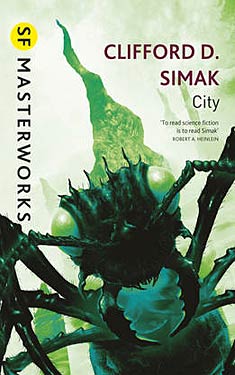
 Clifford Simak‘s City won the 1953 International Fantasy Award, which was awarded to a science fiction or fantasy book. This book is more the latter, despite its later inclusion in later collections such as the SF Masterworks, Easton Press Masterpieces of Science Fiction, and the Locus Best SF Novels of All-Time.
Clifford Simak‘s City won the 1953 International Fantasy Award, which was awarded to a science fiction or fantasy book. This book is more the latter, despite its later inclusion in later collections such as the SF Masterworks, Easton Press Masterpieces of Science Fiction, and the Locus Best SF Novels of All-Time.
Yes, this book is science fiction, and contains references to space and dimensional travel. Despite one of the stories being set on Jupiter, these are only references. This book focuses more on human development over a very long scale. It was originally published as a series of short stories in Astounding Science Fiction magazine. These stories are collected with interspersed brief commentaries from scholars of a future dog civilization.
GMRC Review: Ring Around the Sun by Clifford D. Simak
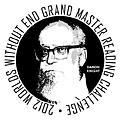 Scott Lazerus came to Worlds Without End looking for a good list of books. He found David Pringle’s Best 100 Science Fiction Novels to his liking and is currently working his way through the list. He has posted a bunch of reviews for WWEnd including several for the GMRC. Be sure to check out Scott’s excellent blog series Forays into Fantasy too!
Scott Lazerus came to Worlds Without End looking for a good list of books. He found David Pringle’s Best 100 Science Fiction Novels to his liking and is currently working his way through the list. He has posted a bunch of reviews for WWEnd including several for the GMRC. Be sure to check out Scott’s excellent blog series Forays into Fantasy too!
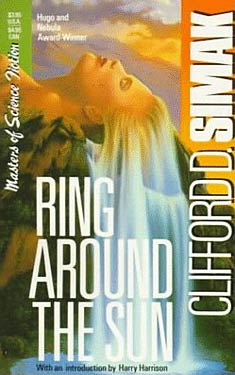 Clifford D. Simak’s stories embody contradictions. Like Ray Bradbury, his writing looks back longingly to an idyllic rural Midwestern childhood. As John Clute and David Pringle put it in The Encyclopedia of Science Fiction, Simak “reigned as the finest pastoral elegist of his genre” from the Golden Age through the 1980s. Unlike Bradbury, though, Simak stuck with science fiction, rather than drifting into realism, and his books have always struck me as a strange combination of futuristic SF ideas and a criticism of the technological, social and economic trends that make the manifestation of those ideas possible. The main theme of Ring Around the Sun (1953), one of his most acclaimed novels, and the one that may come closest to crystallizing the themes that run throughout his career, is that humanity’s biological and social evolution hasn’t kept up with its technological capabilities, resulting in the inevitability that humanity will destroy itself.
Clifford D. Simak’s stories embody contradictions. Like Ray Bradbury, his writing looks back longingly to an idyllic rural Midwestern childhood. As John Clute and David Pringle put it in The Encyclopedia of Science Fiction, Simak “reigned as the finest pastoral elegist of his genre” from the Golden Age through the 1980s. Unlike Bradbury, though, Simak stuck with science fiction, rather than drifting into realism, and his books have always struck me as a strange combination of futuristic SF ideas and a criticism of the technological, social and economic trends that make the manifestation of those ideas possible. The main theme of Ring Around the Sun (1953), one of his most acclaimed novels, and the one that may come closest to crystallizing the themes that run throughout his career, is that humanity’s biological and social evolution hasn’t kept up with its technological capabilities, resulting in the inevitability that humanity will destroy itself.
In 1987, Earth is still threatened by Cold War superpower rivalries, with war seemingly always around the corner, while the ennui of modern life has led people to retreat into a movement called Pretentionism. Clubs have formed in which people get together to share their hobby of historical role-playing, retreating into an imagined past that implies a psychological rejection of the contemporary world. Jay Vickers is an introverted writer who disdains the Pretentionists, but realizes that his own retreat from the world into writing is just another symptom of the same social malaise.
GMRC Review: Way Station by Clifford D. Simak
 Guest Blogger, Allie McCarn, reviews science fiction and fantasy books on her blog Tethyan Books. She has contributed many great book reviews to WWEnd and has generously volunteered to write some periodic reviews for our blog.
Guest Blogger, Allie McCarn, reviews science fiction and fantasy books on her blog Tethyan Books. She has contributed many great book reviews to WWEnd and has generously volunteered to write some periodic reviews for our blog.
Editor’s Note: This is a May GMRC review that we didn’t get around to posting in time.
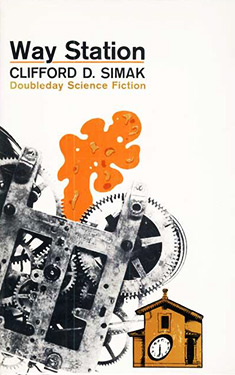 Way Station by Clifford D. Simak
Way Station by Clifford D. Simak
Published: Galaxy Science Fiction, 1963
Awards Won: 1964 Hugo Award
The Book:
"After the Civil War, the soldier Enoch Wallace returned to his family farm and rural hometown. After his parents’ death, he maintained a solitary lifestyle in that home, enduring for over a century with no apparent physical change. He lives peaceably, causing no trouble and existing only as a mild curiosity to his fellow townsfolk.
The secret of his eternal youth is technology, not magic. The truth is, Enoch has been recruited by an alien he named ‘Ulysses’ to run Earth’s first galactic way station. Unable to reveal his secrets to the world at large, he carefully records all the knowledge and wisdom he can gain from the many aliens with which he is able to converse. Now, however, people are starting to notice his unusual longevity, and it seems that he may not be able to keep the secrets of his strange life from being finally revealed." ~Allie
I first encountered Clifford D. Simak in middle school, through a tattered copy of City that I miraculously discovered a tiny classroom library. I hadn’t read any of his work since then, but WWend’s Grand Master’s Reading Challenge gave me the necessary push to finally read his Hugo winning novel!
My Thoughts:
Simak’s writing style in Way Station is very simple and clear, and it reminds me a bit of Asimov‘s style. I think the simplicity of the writing might annoy some readers, but I felt like it fit well with the tone of the novel. It is a slow-paced novel featuring a lonely near-immortal in a rural area. Despite the comings and goings of aliens, Enoch was a fairly unsophisticated man who had been leading an uncomplicated, if unusual, life. I found the character of Enoch very refreshing. He spent a lot of time carefully thinking through questions of morality and loyalty, as he slowly made peace with his own life. There were not all that many other developed characters in the novel, but it was very easy to empathize with Enoch’s thoughtful loneliness.
Most of the other characters, such as the coffee-drinking alien Ulysses, the well-meaning government agent, and the negative-stereotype-redneck Fisher family, were not deeply characterized beyond their initial impressions. The most developed secondary character, Lucy Fisher, seemed to be a little potentially problematic. Lucy is a young deaf girl that cannot speak, who is portrayed as having a kind of spiritual and magical purity and goodness born of her detachment from the modern world. Besides being a bit unlikely, Lucy’s portrayal did not bother me too much, but I imagine that it could be insurmountably irritating to people who have more personal experience with hearing disabilities.
Simak’s aliens and technology have a much more mystic and magical cast than most science fiction I’ve read. For instance, instead of having the aliens abolish religion, Enoch learns that all the aliens believe in a spiritual force. Many of the trinkets Enoch is gifted with, and the technology of the way station itself, are never completely explained. While some are clearly advanced technology, others appear to actually be mystical in nature. Since we see everything through Enoch’s point of view, we can only read what he is able to understand. I thought this was effective in communicating the idea of the massive wealth of knowledge of the universe, only a small fraction of which Enoch can ever truly grasp.
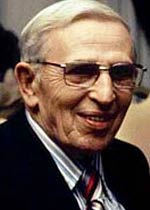 The story of Way Station moved rather slowly, and tended to go off on digressions and subplots that had only a tenuous connection to the main plot. Some of these subplots were actually quite interesting in their own right, but they did start to make the book feel a little unfocused. One in particular, concerning ‘shadow people’ that Enoch created from his own thoughts, seemed almost to be a criticism of traditional pulp characters. The conclusion of the subplot seemed to state that neither a wish-fulfillment version of oneself, nor a woman created solely to fill one’s romantic needs constitutes a believable person. Another tangential plot was the imminent threat of nuclear war, which dated the novel a bit. Many different subplots appeared to be coming together for the ending, but the conclusion ending up to be a disappointing one of the deus ex machina variety.
The story of Way Station moved rather slowly, and tended to go off on digressions and subplots that had only a tenuous connection to the main plot. Some of these subplots were actually quite interesting in their own right, but they did start to make the book feel a little unfocused. One in particular, concerning ‘shadow people’ that Enoch created from his own thoughts, seemed almost to be a criticism of traditional pulp characters. The conclusion of the subplot seemed to state that neither a wish-fulfillment version of oneself, nor a woman created solely to fill one’s romantic needs constitutes a believable person. Another tangential plot was the imminent threat of nuclear war, which dated the novel a bit. Many different subplots appeared to be coming together for the ending, but the conclusion ending up to be a disappointing one of the deus ex machina variety.
My Rating: 3.5/5
Way Station is the simply written account of a rural man, Enoch Wallace, who is tasked with running Earth’s only traveling station for aliens from all over the galaxy. It is a rather slow, contemplative novel, filled with Enoch’s thoughts and observations. I enjoyed seeing the various aliens and the alien artifacts through Enoch’s viewpoint, and I liked that the reader was almost never presented with a complete explanation for any of them. I found it interesting that Simak’s galactic empire still had room for mysticism and spirituality. One flaw of the novel was its occasional lack of cohesion, as the story sometimes wandered down side paths that were not particularly relevant to the central story. Other problems concern the frustratingly simple ending and a problematic portrayal of a young girl with a hearing disability. Way Station is a novel that shows its age, but I think it is definitely still worth reading.
GMRC Review: Way Station by Clifford D. Simak
 Jeremy Frantz (jfrantz) reviews SF/F books on his blog The Hugo Endurance Project where he has given himself just 64 weeks to read every Hugo Award winner. This is his fourth GMRC review.
Jeremy Frantz (jfrantz) reviews SF/F books on his blog The Hugo Endurance Project where he has given himself just 64 weeks to read every Hugo Award winner. This is his fourth GMRC review.
 As Way Station begins, we learn that the CIA has been monitoring Enoch Wallace for many years. He has committed no crime; he is no threat to national security. Instead they’re concerned because he is nearly 125 years old. He fought in the Civil War at the Battle of Gettysburg and no one can explain his elongated years, nor do his neighbors care to figure it out. What they find when they start to investigate his property more closely is alarming to say the least.
As Way Station begins, we learn that the CIA has been monitoring Enoch Wallace for many years. He has committed no crime; he is no threat to national security. Instead they’re concerned because he is nearly 125 years old. He fought in the Civil War at the Battle of Gettysburg and no one can explain his elongated years, nor do his neighbors care to figure it out. What they find when they start to investigate his property more closely is alarming to say the least.
Turning a Phrase
Way station is a welcome respite from the pace and paleness of many of the other early Hugo winners. The way that Simak could create a sense of place and fill it in with the kind of details that stick with you, was something completely different than the other winners up to this point. Imagine you visited the same valley every summer, then one year you don’t make it until autumn and you see all the colors of the leaves and smell the crisp air and it is an entirely new place. That was exactly my experience with Way Station. Well…not literally, but so much SF lures you in with incredible science and fantastic spaceships or intergalactic warfare and just generally assaults the senses into shock and awe. Simak invites you in, pours you tea and introduces you to a character-led story that is both relaxing and as gripping as any high-flying SF.
I may have complained before that some, especially Zelazny, like to throw their readers into the middle of a story and let them catch up in their own time, likely many pages in. Simak eases you into a world which is every bit as strange, but helps you to feel so much a part of it you can’t help being interested from the very first page. Of course both styles are absolutely respectable methods for beginning a tale, but in this case, Simak introduces his characters with a grace and thoughtfulness that rivals any of the best literature (mainstream or genre). Just have a taste or two:
The noise was ended now. The smoke drifted like thin, gray wisps of fog above the tortured earth and the shattered fences and peach trees that had been whittled into toothpicks by the cannon fire. For a moment silence, if not peace, fell upon those few square miles of ground where just a while before men had screamed and torn at one another in the frenzy of old hate and had contended in an ancient striving and then had fallen apart, exhausted.
…
There were proud names that were the prouder now, but now no more than names to echo down the ages—the Iron Brigade, the 5th New Hampshire, the 1st Minnesota, the 2nd Massachusets, the 16th Maine.
And there was Enoch Wallace.
He still held the shattered musket and there were blisters on his hands. His face was smudged with powder. His shoes were caked with dust and blood.
He was still alive.
Chapter 1
“His name,” said Lewis, “is Enoch Wallace. Chronologically, his is one hundred and twenty-four years old. He was born on a farm a few miles from the town of Millville in Wisconsin, April 22, 1840, and he is the only child of Jedediah and Amanda Wallace. He enlisted among the first of them when Abe Lincoln called for volunteers. He was with the Iron Brigade, which was virtually wiped out at Gettysburg in 1863.”
Chapter 2
You could see the smoke right? Smell the gunpowder and just picture yourself among the peach trees? I know I could. And if that wasn’t enough to make you want to dive head first into Way Station, then he begins Chapter 2 with that second gem. Come on—that’s just too much fun!
Building a Universe
 Amidst those beautiful descriptors exists some pretty loosey-goosey scientific descriptions and alien creatures. Simak was nowhere afraid to dismiss laws of physics or explanations of some of the underpinnings of the universe. In contrast to such precision in his storytelling elsewhere, is that a bad thing?
Amidst those beautiful descriptors exists some pretty loosey-goosey scientific descriptions and alien creatures. Simak was nowhere afraid to dismiss laws of physics or explanations of some of the underpinnings of the universe. In contrast to such precision in his storytelling elsewhere, is that a bad thing?
My first thought is that this would normally detract somewhat from any story. Certainly people always notice, and many are bothered, when some anachronistic bit of science or defunct company name pulls you out of the story. When alien technology is so foreign and unexplainable, or when something is so glaringly ridiculous, it can interrupt a story just as much as the worst anachronism.
This is exactly the kind of thing that happens in Way Station. What’s that—an amorphous blob in a tank, clicking at Enoch to leave him alone? How does that work? Not sure, but let’s not think about it too much and just move on. How about the suggestion to make everyone in the world too stupid to understand technology? Well, practically everything we use is some kind of technology and that so much of the meaning of our existence comes from our interaction with technology (so says Heidegger anyway) so I’m not sure exactly how that might work.
But you know what? Those “problems” are also what make this book wicked cool! Super-freakazoid aliens and wacky theoretical science are pretty rad in themselves and Simak, finds a way to make it rad-er! In Enoch’s universe, it is precisely the unintelligibility that contributes to his feeling of loneliness, hopelessness and on-again off-again pessimistic view of humanity. I mean, what could have had me questioning the story so much that it could have been difficult to read, actually ended up propelling the story and contributed to the feeling of dis-ease about the world. Yeah, that’s bad…Michael Jackson bad.
Recommendation
If the Clifford D. Simak Estate were looking to pay someone to just read and re-read this book over and over forever…I’d do it. No lie. I can’t say enough good things about this novel. It reads like literature, poetry sometimes, and sounds like SF. There are crazy aliens, sweet space travel, an awesome house, beautiful landscapes, complex personalities and despair at the human condition. Is there really anything more you could ask for?



















 Full Details
Full Details

